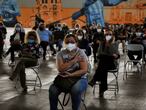The Minister of Health, Carolina Darias, presides by videoconference, with the Minister of Territorial Policy and Public Function, Miquel Iceta, the meeting of the Interterritorial Health Council, this Wednesday at the Palacio de la Moncloa. Fernando Calvo / Moncloa / EFE
Nth twist to vaccination with the AstraZeneca drug.
After the European Medicines Agency (EMA) found “possible links” between the cases of thrombi and the administration of the vaccine, Spain has once again reviewed the immunization strategy with this medicine.
The Ministry of Health and the autonomous communities have agreed to temporarily suspend its use in those under 60 years of age - at this point in the vaccination process, most of them are essential personnel, such as teachers or police officers.
Although the European Medicines Agency concluded that the benefits continue to outweigh the risks and avoided setting an age limitation - most cases have been detected in women under 60 years of age, but the regulatory body has not been able to verify specific risk factors -, the Ministry of Health has proposed, after meeting with its European counterparts, to limit its use in this age group by appealing to the “precautionary principle”.
Fear of blood clots with the AstraZeneca vaccine blocks the way back to normal life
The Government calls the communities to order so that they do not decide on their own about vaccination
EMA Finds "Possible Links" Between Very Rare Cases of Thrombi and AstraZeneca's Vaccine
The swings with the doses of the Anglo-Swedish company do not stop.
Although the EMA never recommended stopping immunization with this drug and gave its endorsement to the administration of the drug from the age of 18, the appearance of several cases of thrombosis in Europe in mid-March after administering this vaccine precipitated that fifteen countries Europeans temporarily stopped the punctures with the AstraZeneca doses.
In a first analysis, the EMA determined that the vaccine was "safe and effective", although the causal link between thrombotic events and the drug could not be ruled out.
The opinion served, however, for most countries to resume vaccination with this drug (including Spain), although some of them, such as the Netherlands or Germany, decided to restrict its use only to those over 60 years of age.
Spain decreed to allocate the drug to the population under 65 years of age (except in the case of essential workers, for whom there was no age limit).
However, the new EMA analysis issued this Wednesday, which has once again supported the vaccine although it has asked that blood clots be listed as "very rare side effects" in the product's technical sheet, has once again shaken the strategy of vaccination in Europe.
The United Kingdom has recommended not to vaccinate with this drug to those under 30 years of age and Belgium has also proposed limiting its use only to those over 55 years of age.
Italy has announced that it will give the second dose to those who have the first, but for the rest, vaccination with AstraZeneca will focus on those over 60.
Following in the wake of these European countries and following the recommendation of the Vaccine Committee that advises the Government, the Minister of Health, Carolina Darias, proposed this Wednesday to the autonomous communities in the Interterritorial Council that Spain stop vaccination in those under 60 Until now, the bulk of AstraZeneca doses - 2.1 million administered - have gone to essential workers, such as teachers and professors, although it has also started to be administered to the general population between 60 and 65 years of age.
This drug was also being injected into health and social health professionals who had not been immunized until now.
For example, workers in health inspection services, legal and forensic medicine, private medical consultations, home help services or other groups such as physiotherapists, occupational therapists and pharmacy office personnel, among others.
Health has also informed the autonomous communities this Wednesday that the Public Health Commission, where the ministry and the regional heads of Public Health are represented, will study how to proceed with people over 65, who until now have only been they were inoculating them with Pfizer and Moderna vaccines.
Carolina Darias, Minister of Health, has assured that in the next few days it will be decided what to do with those citizens under 60 years of age who have already received the first dose of the AstraZeneca vaccine, once the Government and the communities have agreed to suspend the vaccination with the Anglo-Swedish drug for those who have not yet reached 60 years of age.
At the moment, he explained at a press conference from La Moncloa, two options are being considered and they are studying the scientific evidence available in this regard: to provide said people with a second dose with an inoculate from another brand or not to inject a second dose, since, has explained, with the first efficiency levels of 70% are reached.
So far 2,154,675 people have received the first dose of the AstraZeneca vaccine and were awaiting the second.
According to sources present at the meeting of the Interterritorial Council, the vast majority of the autonomies were in favor of the ministry's proposals.
Only the Basque Country and Ceuta abstained and the Community of Madrid was against it.
The community explained that they did not agree with excluding those under 60 from vaccination with AstraZeneca because the measure is not based on the Conclusions of the European Pharmacovigilance Risk Assessment Committee.
Among the experts, there is a diversity of opinions.
Amós García, president of the Spanish Association of Vaccination, sees “reasonable” to change the indication profile of the drug and ensures that in the pandemic context, this drug cannot be renounced.
“When establishing the causal relationship, it is quite reasonable that, in a European context, the precautionary principle should prevail and although the risk of these processes is minimal, the fact of being able to modify the population scope to which you direct the vaccine guarantees that principle precautionary".
However, Daniel López-Acuña, former Director of Emergencies at the World Health Organization, disagrees: “I have trouble understanding this decision.
I do not consider that it has an epidemiological or public health rationale.
I would have expanded the use to over 65s. I don't see any reason not to vaccinate men under 60 years old.
The decision of the Interterritorial Council is not consistent with the recommendation of the EMA and the WHO that the drinkers far outweigh the risks ”.
In any case, the new script twist on vaccination with the AstraZeneca drug once again makes it difficult to manage the vaccination strategy.
To begin with, because the bulk of essential workers under 60 pending vaccination remain in limbo, waiting for a decision with which drug they will be immunized.
And you also have to see what happens to those who have already been vaccinated with the first dose and have to receive a second injection (the period is about 12 weeks between the first and second puncture).
By age groups, only 2% of the population between 18 and 24 years of age have the complete vaccination schedule;
among people aged 25 to 49, it is 4.5%;
Between 50 and 59, 6% are fully immunized.
“It will inevitably delay the vaccination schedule.
And it will create more pressure to use the scarce Pfizer and Moderna vaccines, ”says López-Acuña.
Uncertainty
Experts also fear that the comings and goings with the AstraZeneca drug will again affect public confidence in vaccines.
"The confidence of the population will be greatly undermined," Tercia López-Acuña.
García warns that the “stigma that there are good and bad vaccines” will spread among the population.
Four vaccines have been approved in the European Union (those from Pfizer, Moderna, AstraZeneca and Janssen, although no doses have yet arrived from the latter).
Spain's goal is to end the summer with 70% of the population vaccinated, although this setback with AstraZeneca's planning could take its toll on that goal.
Since the vaccination campaign started in Spain on December 27, the communities have injected 9.3 million doses, which means that almost three million people (7.3% of the population) have completed the vaccination.
With information from
Daniel Verdú, Isabel Valdés
and
Juan José Mateo
.









